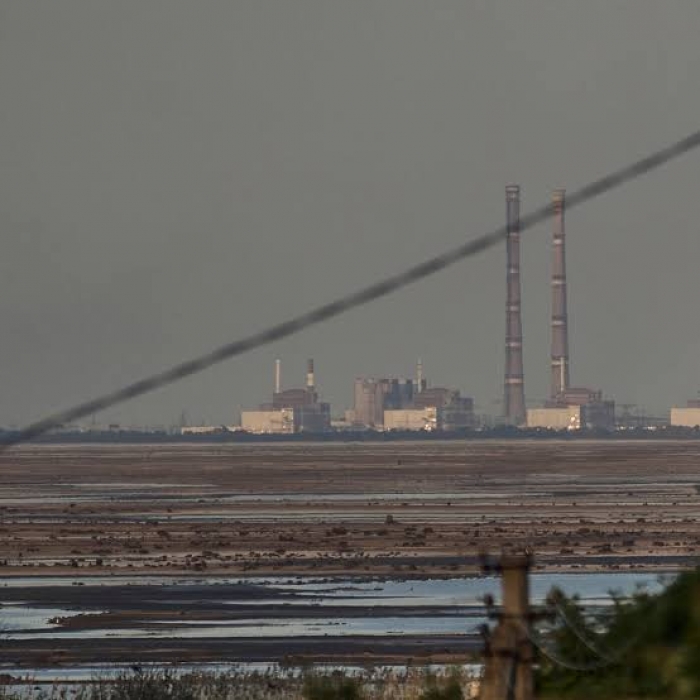RUSSIAN PERSPECTIVE
Ukraine launches drone attack near Europe’s largest nuclear power plant
Kiev’s forces have once again attacked the grounds of the Zaporozhye Nuclear Power Plant (ZNPP) using a kamikaze drone, the facility’s press service reported on Wednesday. The facility is the largest of its type in Europe.
According to a message issued by the service on Telegram, the drone reportedly hit a transport workshop of the ZNPP but did not cause any casualties or critical damage to the facility.
The strike comes amid a series of UAV attacks on the city of Energodar, located next to the facility, over the past two days, the press service said. It stressed that the shelling of civilians and attacks on the nuclear plant and its infrastructure are “unacceptable and clearly constitute terrorist acts.”
Throughout the Ukraine conflict, the ZNPP has repeatedly been targeted with drones and artillery since the Russian military captured the facility in the early months of its campaign.
The co-chairman of the council on integrating Russia’s new territories, Vladimir Rogov, also claimed in an interview last month that Ukraine’s special forces were in the midst of conducting exercises that focused on crossing the Dnieper river and capturing a “large man-made object.”According to Rogov, this “object” appears to be the ZNPP.
Moscow and Kiev have blamed each other for the shelling of the plant while Ukraine and its Western backers have accused Russia of using the facility as cover for its troops.
However, International Atomic Energy Agency (IAEA) Director General Rafael Grossi was unable to confirm the accusations after personally visiting the facility on several occasions. Following his latest visit in April, he admitted seeing armored vehicles and some security presence at the station, but said that there was “no heavy weaponry” or prohibited arms such as tanks, artillery or rocket launchers.
Nevertheless, Grossi was unable to determine which side had been attacking the facility, stating that the IAEA does not have a mandate to make such determinations and that “indisputable evidence” was needed to establish the culprits.
Meanwhile, Russia’s permanent representative to the UN, Vasily Nebenzya, stated last month following a UN Security Council meeting that the West, after accusing Russia of being responsible for the dangerous situation at the ZNPP, has effectively issued Moscow an ultimatum: “hand over control of the ZNPP to Kiev and then the attacks will stop.”
Nebenzya stated that the West had thereby “not only betrayed the Zelensky Regime completely, but also actually admitted to complicity in these irresponsible attacks.”
WESTERN PERSPECTIVE
Zelenskiy says Ukraine needs system to defend against Russia's guided bombs
President Volodymyr Zelenskiy issued a fresh plea on Wednesday for upgraded defence systems to protect Ukraine's cities against guided bombs, which he described as the "the main instrument" now used by Moscow in its attacks.
Zelenskiy has long called for improved air defences as Russia intensifies its assaults on energy and other infrastructure. Russia says it does not deliberately target civilian sites, but thousands have been killed and injured since its February 2022 invasion of Ukraine.
Speaking in his nightly video address, Zelenskiy said Ukraine had made progress in developing electronic weaponry, "but in countering Russian bombs much remains to be done."
"There can be no alternative. Ukraine needs systems and tactics that will allow us to protect our positions, our cities and our communities from these bombs," he said.
"This is now practically the main instrument of Russian terror and in the occupiers tactics.
Earlier this month, Zelenskiy said Russia had used more than 3,200 guided bombs against Ukrainian targets throughout April, along with more than 300 missiles and about 300 Shahed-type drones.
Russia has increasingly resorted to these bombs, which are directed to a target by a guidance system, have great destructive potential and pose fewer risks to air crews delivering them.
In his comments, Zelenskiy said four more countries -- Albania, Austria, Chile and Mozambique -- had agreed to attend a "peace summit" in Switzerland in June with the aim of creating a broad front to oblige Russia to agree to a peace settlement under the terms of the U.N. Charter and acceptable to Kyiv.
"Russian aggression has tried to turn the U.N. Charter into a museum exhibit," he said. "Our peace summit, the participation of global leaders, can restore the full effectiveness and full protection of the U.N. Charter to every nation."
Zelenskiy's peace plan calls for the withdrawal of all Russian forces and the restoration of Ukraine's 1991 borders.
Russia, which rejects the plan, is not invited to the June meeting and dismisses as pointless any discussion of the conflict without its participation.
RT/Reuters

